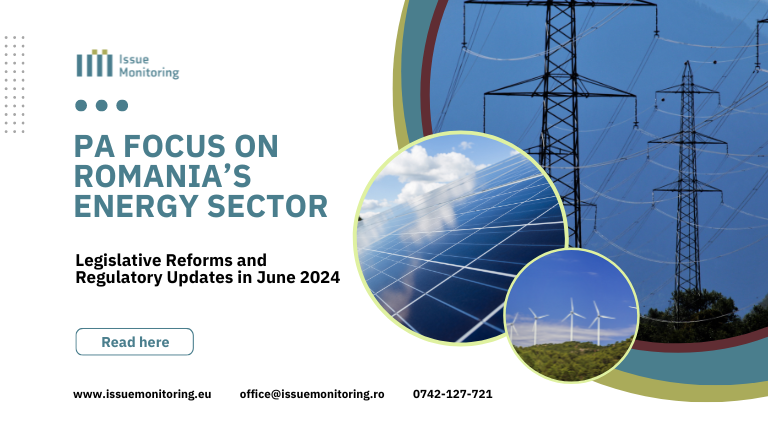
Article written by Eusebiu Stamate, Public Policy Analyst @Issue Monitoring
In June 2024, Romania witnessed a series of significant legislative and regulatory reforms aimed at transforming its energy sector. This article delves into the key legislative proposals, regulatory changes, and strategic directions that are shaping the future of Romania’s energy landscape.
Pioneering Climate Change Legislation. The Romanian Senate has introduced a groundbreaking climate change legislative proposal that aims to embed climate change mitigation and adaptation strategies into the country’s national framework. Spearheaded by MPs from the PSD-PNL Coalition and UDMR, this proposal is a bold step towards achieving climate neutrality by 2050. It sets out sector-specific emission targets and proposes the establishment of a Scientific Advisory Council for Climate to guide policy decisions. By aligning with EU directives, this initiative emphasizes sectoral diversification and green job creation, reflecting Romania’s commitment to sustainable development and global climate goals.
Energy Transition Ordinance and Controversial Measures. The Chamber of Deputies adopted the Energy Transition Ordinance, which includes two highly debated provisions. Firstly, prosumers with renewable energy installations up to 400 kW are now mandated to install energy storage batteries. Non-compliance will lead to a reduction in their surplus energy injection capacity into the grid, a move criticized for its potential financial impact on renewable energy investments. Secondly, the ordinance requires companies to continue selling natural gas at capped prices for household consumption and thermal plants in Q1 2025, a measure aimed at consumer protection but criticized for its potential to undermine financial sustainability in the sector.
Renewables and Market Dynamics. In a move to further integrate renewable energy into the market, the Parliament passed the Use of Energy from Renewable Sources Ordinance. The draft bill underwent multiple legislative phases, starting with an admission report that included amendments. It was then sent back to committees for unclear reasons, but deputies later reaffirmed the initial amendments which will require electricity suppliers to let prosumers and active consumers sell their electricity at the hourly Day-Ahead Market (DAM) price, enabling them to benefit from market price fluctuations without complex processes. The law awaits the President’s signature.
Oil Royalties Adjustments. Parliament passed a law adjusting oil royalties annually based on the previous year’s inflation. Oil and condensate royalties range from 4.5% to 16%, natural gas from 4.5% to 15%, and petroleum transport through state-owned terminals to 11.5%. Natural gas storage incurs a 3.5% royalty. These changes apply to existing petroleum agreements without specified rates. The law also allows the State Domains Agency to lease degraded agricultural lands for renewable energy projects.
Energy Transition Fund. The Romanian Government also approved a new ordinance clarifying VAT and excise duties for mineral deposits in Romania’s Black Sea zones and setting regulations for non-reusable packaging in the waste management system. Before adoption, it was amended to allocate 2024’s solidarity tax contributions to the Energy Transition Fund. The solidarity tax, introduced by Romania in 2022, targets companies in the crude petroleum, natural gas, coal, and refinery sectors with profits exceeding a 20% increase over the average from the past years. It aimed to address high energy prices. As energy providers are reimbursed for the capped prices from the Energy Transition Fund, it appears the state plans to fund this Energy Transition Fund, in 2024 as well, with solidarity tax money, to address the substantial debts owed to energy providers due to the price caps. This ensures providers are compensated for their losses while maintaining stable energy prices for consumers.
Regulatory Enhancements by ANRE. The Romanian Energy Regulatory Authority (ANRE) has implemented several regulatory updates to enhance transparency and efficiency in the energy market. Notably, ANRE approved a 19% increase in natural gas distribution tariffs, reflecting the need to adjust to rising operational costs. Additionally, ANRE revised the CfD Methodology and Framework Contract, simplifying billing processes and introducing penalties for delayed payments.
Strategic Vision for 2025-2035. Looking ahead, the Ministry of Energy has unveiled the Romanian Energy Strategy 2025-2035, which is now open for public consultation. This comprehensive strategy outlines key objectives such as energy security, low-carbon emissions, energy efficiency, and digitalization. It represents a forward-thinking approach to ensuring a sustainable and secure energy future for Romania.
Conclusion
Romania’s recent legislative and regulatory reforms represent notable steps forward in the country’s energy policy. These reforms aim to tackle climate change, increase reliance on renewable energy sources, adjust fiscal measures, and strengthen regulatory frameworks. While aligning with global climate objectives, these measures are expected to have varied but meaningful impacts on the energy sector in the coming months. However, all these changes seek to enhance sustainability and security in Romania’s energy landscape amidst ongoing challenges and evolving market dynamics.
Our clients receive a comprehensive report on legislative changes in their field of activity, a new Issue Monitoring product designed for Public Affairs professionals and legal departments in large companies. If you also want to be the first to know about legislative news in your field, fill out this form for a free demo on the Issue Monitoring platform.


